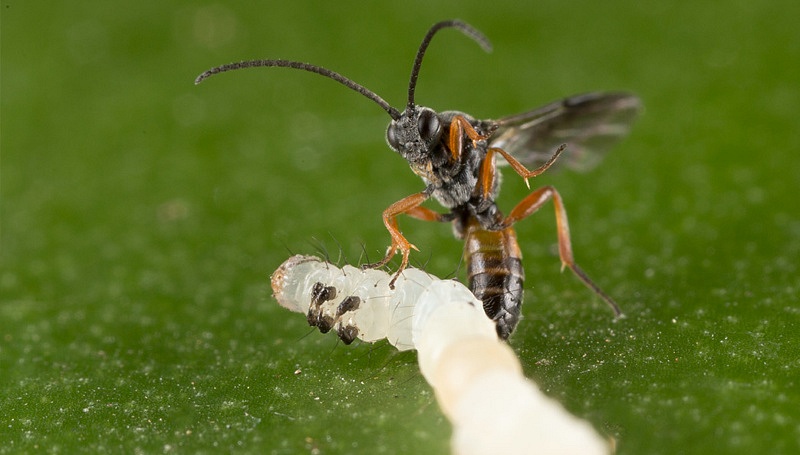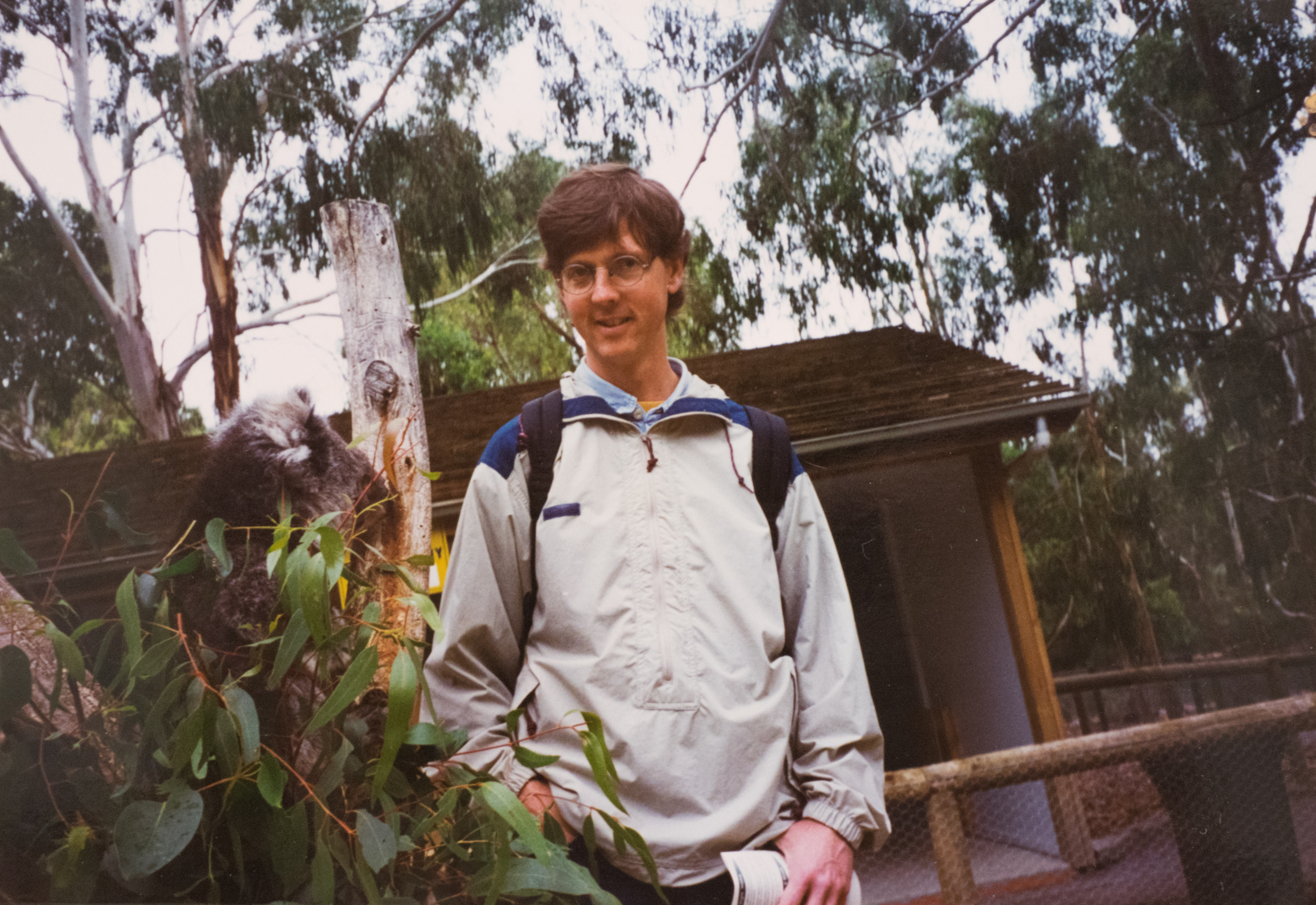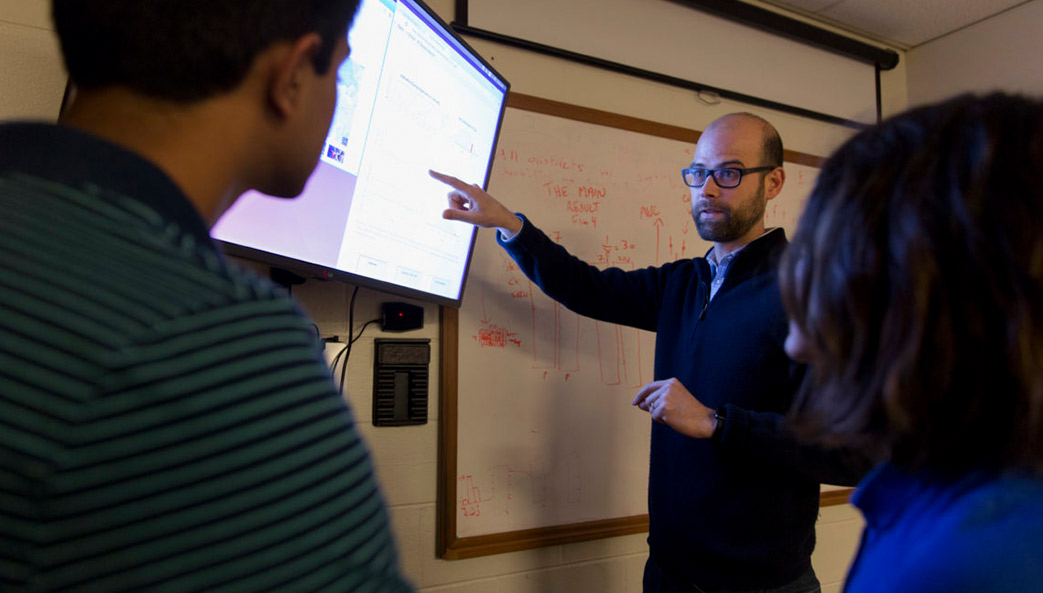In 1979, moviegoers fell in love with Alien, a sci-fi horror film that spent several weeks as No. 1 at the box office. The story of a spaceship crew encountering an extraterrestrial life form featured a notable scene—an alien bursting from the chest of a crew member used as its host. It was a parasitoid, an organism that develops on or in a living organism, feeding from and eventually killing the host.
Not long after Alien made its debut, Michael Strand fell in love with parasitoids. Today Strand is a UGA entomologist who has been elected to the National Academy of Sciences. But back then, he was a college student, and his introduction happened in a lab, not a movie theater.
When he was a junior at Texas A&M University, Strand had what he describes as a “religious experience.” He’d enrolled in a survey course in insect biology and also taken a job in an entomology lab. The combined experiences opened his eyes to the diversity and importance of insects.
“Life would cease to function if insects went away tomorrow,” he said. “Think about every plant that’s pollinated by an insect. Virtually all nutrient recycling in terrestrial ecosystems requires insects. Insects are the food for virtually every vertebrate in some way. I think people just don’t know that. I didn’t.”
His job involved collecting glands from fire ants, and Strand discovered an affinity for being precise, persistent and patient with the repetitive tasks that make up the day-to-day work in a science lab. His next project involved parasitoid-host interactions, his first introduction to this type of creature.
“I had never heard of these things, but Alien had just come out, and that’s a giant space parasitoid,” he said. “I just thought, ‘What amazing critters.’”

Driven in part by a desire to continue working on parasitoids, Strand stayed at Texas A&M to earn a Ph.D. in entomology and then accepted a post-doctoral position at Imperial College London. After a short stint at Clemson University, he joined the University of Wisconsin-Madison.
Once there, he realized that he wanted to go in a new direction. His Ph.D. project had been ecologically and behaviorally oriented, so he retrofitted. After doing what he calls “remedial education,” he established a lab where he could explore insects at a molecular level, working to understand the genes and interactions between molecules that regulate cell function in organisms.
Since then, Strand has followed his muse wherever it takes him, including moving to UGA in 2001. Now he is Regents’ Professor in the College of Agricultural and Environmental Sciences, with an affiliated appointment in the genetics department of the Franklin College of Arts and Sciences.
He describes himself as a generalist, a jack-of-all-trades but master of none who’s always been innately and broadly curious about biology.
“I’m not translationally driven. I’m unapologetically not dedicated to a particular translational endpoint, although I fully appreciate the importance of translational applications,” he said.
“I see myself more as generally knowledgeable on a broader front, but not an expert, perhaps, in anything.”
Mark Brown, UGA professor of entomology, has a different take.
“About five or six years ago, Mike said to me, ‘Nobody knows anything about gut microbes in mosquitoes and how they affect development,’” Brown said. “In that time, he has cut an incredible swath in developing that area of research.”
Strand has also developed working relationships with peers in fields like ecology, virology, biochemistry and molecular biology. Those colleagues, working in their individual fields, may not realize that Strand explores so many different areas.
“Folks may know he’s done this work with polydnaviruses and parasitoids, but they may or may not be aware of the work that he’s done with me and others on the endocrinology of mosquitoes,” Brown said.
“Mike is the only individual I know who is working the way he does across so many different areas and is so successful.”
This spring, Strand was elected to the National Academy of Sciences—he is UGA’s eighth member of the National Academies, which also include engineering and medicine.
On paper, he seems like a shoo-in. He’s published more than 220 research papers and garnered nearly $28 million in external funding from agencies including the National Institutes of Health, the U.S. Department of Agriculture and the National Science Foundation. His findings have been cited often enough to place him in the top 1 percent of biologists. He has delivered invited seminars and symposia in nearly every department of entomology in the U.S. and at universities and conferences in Europe, Asia, South America, Africa and Australia.
But Strand, who’s also a member of UGA’s Center for Tropical and Emerging Global Diseases and the Faculty of Infectious Diseases, believes he’s not the typical inductee.
“I think part of the reason that I got elected was because I’m a throwback to when life scientists were less specialized than is usually the case today.”
But according to Brown, this kind of recognition requires a combination of time, breakthroughs and consistency in productivity.
“Sometimes it’s broadening an area of research, sometimes it’s deepening an area of research,” he said, “and Mike manages to do both wherever he is working.”
Strand is also working to inspire the next generation of scientists.
“What I like about teaching survey courses is sharing what you think is interesting about the subject,” he said. “I also really like introducing students to the process of science, showing them how it’s actually done.”
But in the age of Twitter, a 24-hour news cycle and shortened attention spans, the scientific process can seem slow and cumbersome rather than methodical and thorough.
“It isn’t necessarily a world of just tweets and Facebook pages,” Strand said. “A lot of things are based on details that aren’t easily distilled into a hashtag.”
The pursuit of scientific knowledge is a marathon, not a sprint, according to Strand. There are no easy answers, and even the generally accepted ones are subject to change as scientists learn more.
“Most subjects are always in a state of revision as we refine what we know,” he said. “There’s nothing wrong with something being wrong and changing. That’s the whole idea.”






